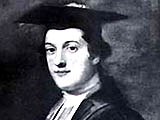George Canning 1827 Tory
 Born: 11 April 1770 in Marylebone, London
Born: 11 April 1770 in Marylebone, London
First entered Parliament: 28 June 1793
Age he became PM: 57 years, one day
Maiden speech: 31 January 1794 speaking on a debate on a treaty with the King of Sardinia, granting him a subsidy to help him fight against the French
Total time as PM: 119 days
Died: 8 August 1827 at Chiswick House, Middlesex
Facts and figures
Nicknames: "The Cicero of the British Senate" and "The Zany of Debate"
Education: Eton and Christ Church College, Oxford
Family: He was married to Joan Scott and had four children
Interests: Theatre, writing poetry, practical jokes and parlour games
Government Art Collection Portrait
Biography
Short term in charge
George Canning died suddenly in office just 119 days after taking up the post.
Popular, witty and intelligent, Canning gained an early political following as an excellent public speaker. He was one of the first politicians to campaign heavily in the country, making many speeches outside Parliament.
He was an enthusiastic follower of Pitt the Younger, resigning from his post as Paymaster General in 1801 when Pitt resigned as prime minister.
Canning was known for his opposition to parliamentary reform and his advocacy of Catholic emancipation.
 In 1807 Canning was made Foreign Secretary under the Duke of Portland. His greatest success was outmanoeuvring Napoleon at Copenhagen by seizing the Danish navy.
In 1807 Canning was made Foreign Secretary under the Duke of Portland. His greatest success was outmanoeuvring Napoleon at Copenhagen by seizing the Danish navy.
But he also quarrelled badly with the War Minister, Castlereagh, over the deployment of troops. When Castlereagh discovered in September 1909 that Canning had made with the Duke of Portland to have him removed from office, he was furious.
Demanding redress, he challenged Canning to a duel, which was fought on 21 September 1809. Canning had never before fired a pistol and completely missed, whilst Castlereagh wounded his opponent in the thigh. Both men resigned as a result of the incident.
To Portugal and back
A few weeks later, Canning was disappointed to be passed over as the choice for prime minister in favour of Spencer Perceval.
His anger was such that he refused a high profile post in Perceval's government. However, after a brief stint as ambassador to Portugal, he returned to join the government as President of the Board of Control.
He later replaced his old rival as Foreign Secretary in Lord Liverpool's government after Castlereagh's suicide in 1822. Once again, he made a successful Foreign Secretary, especially in preventing South America from falling into French hands.
Canning replaced Liverpool as PM on 10 April 1827, and set about forming a coalition with the Whigs under Lord Lansdowne.
But on 8 August 1827, Canning died from pneumonia at Chiswick House, after spending barely five months in office. His last words were 'Spain and Portugal'.
He has come to be regarded by some as a 'lost leader', with much speculation about what would have happened had he lived.
Quote unquote
"The happiness of constant occupation is infinite."
Did you know?
Canning holds the record of having served as prime minister for the shortest period. He is buried in Westminster Abbey.
Wife
Five years younger than Canning, Joan Scott preferred to stay in the background rather than playing the role of society heiress. Canning adored her and trusted her judgement on everything, discussing all his public and private concerns with her. She was created Viscountess Canning soon after her husband's death.